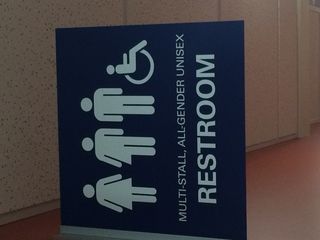Transgender
What's the Big Deal About Bathrooms?
Why bathroom access matters for all (especially transgender) kids in school
Posted May 10, 2016
As some of you may know, there is a court battle brewing between the US government and the state of North Carolina over their new bathroom bill (HB2). The Governor of North Carolina stated that there are no legal protections based on transgender status, however the Office for Civil Rights has published legal guidance that interprets discrimination on the basis of sex to include sex-stereotyping and applies Title IX to protect students from homophobic harassment and transphobic harassment as they are forms of ‘sexual harassment’.

Why must we ensure that people have access to bathrooms based on their gender identity? For now, the international building code requires that there are a certain number of male-designated toilets and female-designated toilets in each building based on some formula related to building size and number of users. As a result, most bathrooms built have to be designated to be single-sex: for males or females. We have literally constructed the gender binary in our buildings and building codes. As a result individuals who are transgender, gender fluid, agender, or genderqueer are often left struggling to find a safe place to perform everyday bodily functions. What does this mean for kids in schools?
- Bathrooms are often sites of crisis and difficulty for transgender and gender nonconforming people. By forcing individuals to publicly enter a space marked ‘male’ or ‘female’ you expose those who don’t visibly conform to sex-stereotypes to gender policing, which can range from stares, mean looks, and rude comments to verbal and physical assault.
- It often means that transgender kids avoid going to the bathroom in public because it is seen as a dangerous place. This leads to urinary tract infections, kidney diseases, digestive system problems, that can have long term complications.
- In many schools transgender youth are asked to use the nurse's bathroom or a staff bathroom to avoid the perceived complications of using the boys’ or girls’ bathroom. This can isolate them from their peers and often makes them late to school obligations due to the location of these private spaces.
- For transgender people who have 'socially transitioned' (are living publicly based on their affirmed gender which is different from their sex assigned at birth), this new law puts them in a very vulnerable and dangerous position which forces them to 'out' themselves as transgender and use a bathroom that does not align with their gender identity.
Fortunately, more and more jurisdictions are finding ways to make more affirming and accessible bathrooms for more people. For example, California is advancing a bill that would require any single-user restroom to be available to users of any gender and Washington, D.C., has required single-person toilets to be labeled "restroom" or have some other gender-neutral sign since 2006. Does anyone remember Ally McBeal? That law firm had a 'unisex' bathroom, and they were constantly breaking into song. Why can't we have more of that?
I really don’t understand why people feel so threatened by transgender people in the bathroom. There are no documented incidents of transgender people assaulting a cisgender person in the bathroom. However, there are countless reports of transgender people being assaulted and harassed in public spaces. The bathroom is a place where every BODY goes to deal with personal hygiene and bodily functions throughout the day. In schools where students don't have access to appropriate facilities they experience many barriers to full inclusion and participation. This can lead to physical health problems as well as mental health concerns. It can also 'push out' these students and give them another reason to give up on school.

In my own research with teachers who work with transgender and gender-creative students in schools, we found that schools who had worked to reduce sex-segregated spaces seemed to be more welcoming and supportive of all kinds of diversity and creativity. We learned about school communities who asked for and created 'all-gender' bathrooms to reduce the harmful impacts of the sex-segregated spaces on their school community. We also learned that schools with restorative justice programs (over traditional discipline & punish approaches) seemed to be more affirming for these students. What this tells me is that the more we cling to traditional notions of gender, hierarchy, and schooling, the more we continue to limit the full participation of every member of our society. If we want to work towards more democratic and equitable communities, we need to start by ensuring that every human being has access to the basic necessities: food, water, shelter, and hygiene.
By creating laws that exclude and limit who can access services and when, North Carolina (and other jurisdictions) are violating the basic human and constitutional rights of their residents and any visitor to the region. I applaud the Attorney General of the U.S. who clearly stated, “This action is about a great deal more than just bathrooms. This is about the dignity and respect we accord our fellow citizens and the laws that we, as a people and as a country, have enacted to protect them – indeed, to protect all of us. And it’s about the founding ideals that have led this country – haltingly but inexorably – in the direction of fairness, inclusion and equality for all Americans.”


